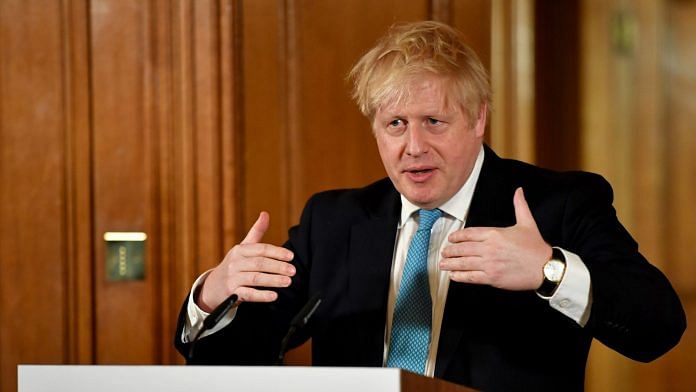This wasn’t the start to the New Year Boris Johnson envisaged. Just weeks after beating the western world to approving the first vaccine against SARS-Cov-2 and launching a massive inoculation campaign, the Prime Minister was left to solemnly declare on Monday that the U.K. is facing a “perilous” moment.
His warnings are reminiscent of the first lockdown when Britons were told they must protect the National Health Service from becoming overwhelmed. Their efforts succeeded then. This time is likely to be a much closer-run thing. While the vaccination program will provide relief, an overrun health service responsible for giving many of the shots will only slow down the process, prolong lockdown restrictions and endanger more lives.
The immediate pressures are centered in London, the place that should be most able to handle high demand for medical services. Last week, Mayor Sadiq Khan declared a “major incident,” the metropolitan equivalent of a national emergency. The move provides more coordination powers, but it is mainly about signaling to Londoners to stay home.
That messaging power may be the most important tool public officials have right now. There are more than 30,000 Covid patients in hospitals in England, compared to around 18,000 at the height of the first wave in April. Ambulance wait times — normally minutes — now stretch into hours in some cases. London’s infection rate is worse than the rest of the country, with one in 30 Londoners (and one in 20 in some areas) estimated to have the virus compared to one in 50 nationally.
The same trifecta of pressures facing London are true in other parts of the country too: a highly infectious new variant of the virus, a less stringent lockdown than in the spring that also came late and a public inclined to interpret the rules more loosely this time. It’s a sign of how bad things have become that even Britain’s noisiest lockdown skeptics, mainly in Johnson’s Conservative Party, have largely turned quiet.
Lockdown naysayers on social media had played down the threat of hospitals running out beds, but there is no denying the shortages. Occupancy of acute hospital beds is currently at nearly 90% in London and not much lower in other parts of the country. In the Paris region, a city with a similar population, the intensive care occupancy rate is around two-thirds.
In modelling by NHS England, even a best-case scenario, including using the spare capacity Nightingale Hospital, would leave London short of nearly 2,000 beds (including intensive care beds) by Jan. 19. In the worst-case scenario, the shortfall in beds would be 4,400.
Some have argued that bed occupancy has long been high, especially in winter. And yet all that shows is that this is a systemic weakness that could be seen before the pandemic. While London receives high scores for many aspects of its health care infrastructure, it falls short on two metrics that are crucial during a pandemic: beds and nursing staff.
Also read: India’s daily cases drop below 13,000, positivity rate at 1.4% — the lowest since June
That’s not a shortage that can be fixed quickly: Even if you add additional beds, you need nurses to serve them. Making matters worse, some 46,000 hospital staff are off work sick with Covid-19 around the country. Health-care workers are being inoculated, but it takes a couple of weeks for the vaccine to provide immunity and it will take time before the bulk of NHS staff have received their shots.
While the virus — and especially the new variant — are the proximate cause of today’s emergency, the roots go back decades as successive governments cut funding, taking from the capital budget to cover running costs and reducing the number of NHS beds along the way. A 2016 analysis by the Nuffield Trust found that more than 95% of hospital beds were in use that winter. The following year, a report by the King’s Fund warned hospitals in England had fewer beds per 1,000 people than any other European Union country: 2.3 compared to an EU average of 3.7.
Fixing that longer-term problem will surely have to be a priority after the pandemic. In the meantime, Johnson has a fine line to tread. If hospitals are overrun, he will be blamed for not preventing many deaths at a time when the vaccine was in hand. If the worst is averted, the pressure will return to ease lockdown restrictions. Johnson may have to make restrictions get tighter still, though for now is hoping more enforcement action will cause a change in behavior.
Some have raised the hope that the combination of infections and vaccinations will mean herd immunity is reached sooner, driving down the virus’s reproduction number and allowing restrictions to be lifted sooner. But herd immunity would likely require much higher infection rates than we are seeing, especially with the new variant. And it’s not yet clear the extent to which the new vaccines prevent transmission.
The vaccination program is picking up pace. That will hopefully enable schools to reopen in February or March. But lifting the bulk of restrictions too early could backfire with people once again letting down their guard and restarting the vicious cycle of infections.
That’s why we’re likely to hear more stark language such as “major incident” and “perilous” moment. It’s the best tool the government has right now while it gets vaccines out. Rather than keep calm and carry on, Johnson needs the public to panic a little and stay home a while longer. –Bloomberg
Also read: Covid improved how the world does science



